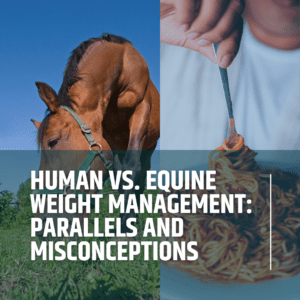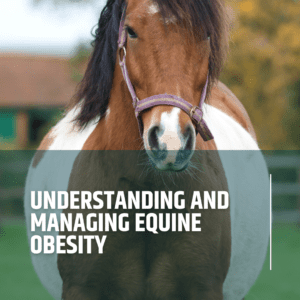
By Ben Nedas
Chief Commercial Officer
Supporting a horse's gut microbiome with supplements: which option is right for your horse?
01
Introduction
There are so many supplements available to horse owners that claim to support the hindgut microbiome. How effective are they?
As the makers of EquiNectar, we feel that digestive enzymes, and more specifically our methods of delivering digestive enzymes, are effective at encouraging the growth of beneficial gut bacteria and reducing the relative numbers of unhealthy bacteria types. We are deeply committed to the science of gut health and make no claims that aren't supported by the evidence.
Let's explore the main types of supplements used and what the scientific literature says.
02
Probiotics for horses
Probiotics are live microorganisms that may potentially confer a health benefit to the host if they are administered in adequate amounts. They are commonly used in human and veterinary medicine as they are believed to have positive effects on overall health and particularly gastrointestinal function. A paper titled "Probiotic Use in Horses – What is the Evidence for Their Clinical Efficacy?" discusses the use of probiotics in horses and concludes that the effects of probiotics are still under investigation, and the results from studies to date are conflicting and questionable (1).
The idea of probiotics was born when Elie Metchnikoff observed that Bulgarians who consumed large amounts of fermented milk seemed to enjoy better health. He postulated that it was the bacteria responsible for fermentation that were responsible for these positive effects and named them Lactobacillus bulgaricus. They became the first recognized probiotics and since then, the idea of probiotics exerting beneficial effects has re-entered the medical field and achieved mainstream medical interest (1).
In horses, probiotics are thought to work through several mechanisms, including modulation of the immune system, antimicrobial production, bacterial toxin inactivation, and an increase in colonisation resistance. However, the quality control of commercial human and veterinary probiotics products is poor, and information on the content of bacterial species and the number of live organisms is often inaccurate in over-the-counter products (1).
Probiotics are increasingly used due to their lack of severe adverse effects, ease of administration, and low cost but more research is needed to prove their efficacy in equine medicine. As the quality of over-the-counter probiotics can vary, this may affect their efficacy (1).
In conclusion, while probiotics are generally considered safe and they might have some benefits, more research is needed to fully understand their effects in horses.
03
Prebiotics for horses
Prebiotics are non-digestible food ingredients that are intended to beneficially affect the horse by selectively stimulating the growth and/or activity of one or a limited number of bacteria in the colon. They improve the host's health by enhancing the population of beneficial gut microbes and suppressing potentially harmful ones.
In horses, prebiotics are often used to support a healthy gut microbiome, which is essential for digestion and nutrient absorption. They might be beneficial for horses with digestive issues, those under stress, or those taking antibiotics, all of which can disrupt the balance of gut bacteria.
Common types of prebiotics used in equine diets include:
- Fructo-oligosaccharides (FOS): These are short chains of fructose molecules that are not digested in the small intestine and thus reach the large intestine, where they are fermented by beneficial bacteria.
- Mannan-oligosaccharides (MOS): Derived from the cell walls of yeast, MOS are thought to bind harmful bacteria in the gut, preventing them from attaching to the gut wall and causing disease.
- Inulin: This is a type of soluble fibre found in many plants. Like FOS, inulin is not digested in the small intestine and is fermented in the large intestine, promoting the growth of beneficial bacteria.
- Beta-glucans: These are sugars found in the cell walls of bacteria, fungi, yeasts, algae, lichens and plants, such as oats and barley. They are thought to have immune-boosting properties.
- Pectin: A type of fibre found in fruits and vegetables, pectin is fermented by gut bacteria into short-chain fatty acids, which provide an energy source for cells in the gut wall.
The report "Effects of a Prebiotic Supplement (Jerusalem Artichoke Meal) on the Fecal Microbiota of Healthy Warmblood Horses in Training: A Longitudinal Study" provides some insights into the effects of prebiotics on horses' digestive health (2).
According to the study, prebiotics aim to stimulate the metabolism of the microbiota in the large intestine. The researchers observed that the dominant phylum in equines was Firmicutes, followed by Bacteroidetes. Feeding Jerusalem Artichoke Meal (JAM), which is a prebiotic, reduced the relative abundance of an unclassified genus from the family Lachnospiraceae in all parts of the large intestine compared to feeding the placebo. Members of the family Lachnospiraceae mainly produce butyrate as a fermentation product and this has several health-promoting effects on the intestine such as stimulating epithelial cell proliferation and improving barrier function. A reduction in this family might therefore have negative consequences for the health of the hindgut.
The study also found that the supplementation of Jerusalem artichoke meal containing prebiotic fructo-oligosaccharides and inulin increased the relative abundance of the dominant genus Lactobacillus and decreased the relative abundance of Streptococcus to a marked extent in the stomach. This alteration might cause a harmful impact on the stomach by increased bacterial metabolism (SCFA production) and possibly a decreased pH value. However, feeding Jerusalem artichoke meal increased the bacterial diversity in all parts of the digestive tract, which might be beneficial for the stability of the gastrointestinal microbial community.
The researchers concluded that despite the large intestine being the declared target for prebiotic interventions, the results of this study show a clear effect in the foregut. Future studies should include the application of prebiotics under different biotic and/or abiotic stressors, as well as different breeds and ages of horses, to better describe the impact of the prebiotics under different physiological conditions. It was clear from the study that prebiotics may have complex effects which are not necessarily all beneficial.
04
Digestive enzymes for horses
Digestive enzymes are crucial for the proper digestion and absorption of nutrients in horses. They are responsible for breaking down the food into smaller, absorbable units. These enzymes are naturally produced in the body, but sometimes, due to various factors like age, stress, or illness, their production may decrease, leading to digestive issues. Supplementing with digestive enzymes can help in such cases.
The primary digestive enzymes include proteases (for protein digestion), amylases (for carbohydrate digestion), and lipases (for fat digestion). These enzymes work in different parts of the digestive tract and at different pH levels to ensure the complete breakdown of food.
A study published in the Equine Veterinary Journal titled "Characterisation of the faecal metabolome and microbiome of Thoroughbred racehorses" suggests that the gut microbiome and metabolome of horses are significantly influenced by diet, exercise, and other environmental factors. The study also highlights the potential role of digestive enzymes in modulating these effects, although further research is needed to fully understand this relationship (3).
Another study titled "Modulation of the equine microbiome by pasture and feed supplements: A metabolomics approach" published in the International Journal of Functional Nutrition and Metabolism, also emphasises the importance of diet and supplementation in shaping the gut microbiome of horses (4). The study suggests that dietary supplements, including digestive enzymes, can significantly influence the gut microbiome and metabolome, potentially improving digestive health and overall wellbeing.
A third study titled "The Effect of Feeding Horses a High Fiber Diet With or Without Exogenous Fibrolytic Enzymes Supplementation on Nutrient Digestion, Blood Chemistry, Fecal Coliform Count, and In Vitro Fecal Fermentation" investigated the effects of a high fibre diet with or without the supplementation of exogenous fibrolytic enzymes on various aspects of equine health. The study found that horses fed enzyme-supplemented diets had greater oat straw and total nutrient intakes compared with the control diet (5). Furthermore, feeding enzyme-supplemented diets increased total nutrient digestibility and blood total protein compared with the controls. Lower faecal coliform count was obtained with horses fed a diet supplemented with a mixture of cellulase and xylanase compared to control horses. The study concluded that the addition of fibrolytic enzymes at 10 mL/mare/d improved feed intake and nutrient digestibility without affecting the mare's health.
In conclusion, digestive enzymes play a vital role in equine health, and supplementing with these enzymes could be beneficial, especially in horses with compromised digestive function.
References
- Journal of Veterinary Internal Medicine - Probiotic Use in Horses – What is the Evidence for Their Clinical Efficacy?
- Plos ONE - Effects of a Prebiotic Supplement (Jerusalem Artichoke Meal) on the Fecal Microbiota of Healthy Warmblood Horses in Training: A Longitudinal Study
- Equine Veterinary Journal – Characterisation of the faecal metabolome and microbiome of Thoroughbred racehorses
- IFNM – Modulation of the equine microbiome by pasture and feed supplements: A metabolomics approach
- Journal of Equine Veterinary Science - The Effect of Feeding Horses a High Fiber Diet With or Without Exogenous Fibrolytic Enzymes Supplementation on Nutrient Digestion, Blood Chemistry, Fecal Coliform Count, and In Vitro Fecal Fermentation
ABOUT EQUINECTAR
Description
EquiNectar® is a natural feed supplement, that is scientifically proven to:
- Re-balance your horse’s gut bacteria
- Help your horse maximise benefits from its feed
- Improve your horse’s condition
More information
EquiNectar® is produced by Tharos Ltd in the UK. It is a natural source of digestive enzymes and contains only the following ingredients:
- Our patented enzyme rich malt extract
- Medium chain triglycerides (from coconut oil)
- Potassium sorbate
For more details of the enzymes within EquiNectar® take a look at the ingredients and enzymes page.
How to feed
Simply add EquiNectar® to your horse's daily feed, using the Feeding Rate chart to determine the correct amount.
For detailed instructions about how to introduce EquiNectar, please read the comprehensive Feeding Guide page.





